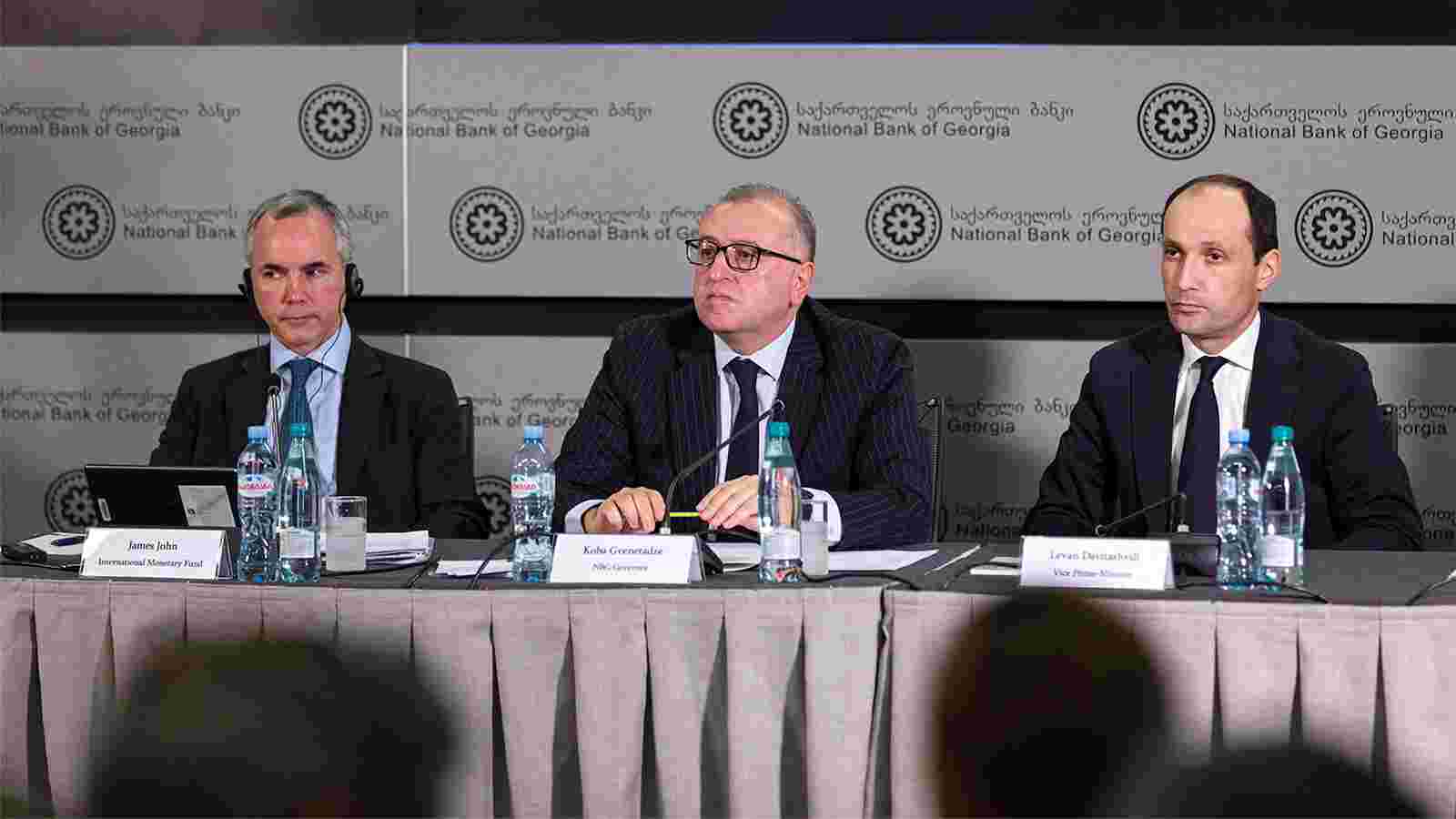
Koba Gvenetadze: “Successful Implementation of the Fund-Supported Program is Crucial”
A summary meeting of the IMF Mission to Georgia and joint briefing with the Georgian authorities was held at the head office of the National Bank of Georgia today. "We are glad that the first review of Georgia’s economic reform program supported by the International Monetary Fund was successfully completed. Completion of the review will make SDR30 million (about $38 million) available to Georgia. The authorities are treating the program as precautionary,” Koba Gvenetadze, Governor of the National Bank of Georgia, stated.
James John, head of the IMF mission, Levan Davitashvili, Vice Prime Minister of Georgia and Minister of Economy and Sustainable Development, and Lasha Khutsishvili, Minister of Finance of Georgia, participated in the briefing. Governor Gvenetadze specified that the Fund-supported program is an indication of the international recognition of the accuracy of our monetary and financial stability policies, helps improve the country's sovereign rating, giving a positive signal to investors.
"The successful implementation of the Fund-supported program is of utmost importance, as the uncertainty remains high on the global scene, and geopolitical circumstances are tense. Prudent policies to bring down inflation, strengthen fiscal and foreign exchange buffers, and advance the structural reform agenda will reinforce macroeconomic stability and enhance resilience. We are glad that the Mission gave a positive assessment to the NBG policies. The IMF welcomes the NBG’s continued commitment to the inflation-targeting framework, the floating exchange rate, and prudent reserve management. The National Bank of Georgia has appropriately maintained exchange rate flexibility and rebuilt international reserves, taking advantage of favorable conditions this year with a surge of external inflows and continuing to buy foreign exchange via standard central bank intervention techniques," the NBG Governor noted.
“Quick and appropriate NBG action has helped limit the impact of the war on the financial sector, including by requiring banks to adhere to relevant sanctions”, the Mission noted. Further, the Mission underscored the NBG reforms covering financial supervision and climate-related financial risks.
“We expect the inflation rate to decrease significantly in 2023, the average rate being around 6%. By the end of the year, inflation will decrease to 3.8%, meaning that an overall downward trend is expected. We anticipate to approach the target by 2024, however, the trend will be observable already in 2023, and in 2024 significant progress will be made in this regard. It is necessary to perceive this issue in the right context. Inflation is a global challenge and Georgia is no exception. Prices are rising in all countries, and this is affected by the supply chain, rising food and energy prices, and the war in Ukraine. The inflation rate will decrease as global shocks subside. There are other factors as well. The National Bank of Georgia implements various measures to reduce inflation, and the downward trend is noticeable. It is very important to note once again that this is a global challenge and does not only concern Georgia," said James John, head of the IMF Mission.
Levan Davitashvili, Vice Prime Minister of Georgia and Minister of Economy and Sustainable Development, underscored the importance of the successful implementation of the IMF program and the Fund’s support, commenting that all this is a positive signal for international investors. "The IMF clearly notes in the first review of the program that the Government of Georgia continues the significant progress achieved in the macroeconomic stability, while also focusing on economic stability, high economic growth and reduction of external vulnerability," Levan Davitashvili said.
Reviewing the country's economic indicators, Lasha Khutsishvili, Minister of Finance of Georgia, focused on the importance of partnership with the Fund in light of the current challenges. "Georgia's economy has demonstrated sustainable recovery in the post-pandemic period. Also, the year 2022 started with positive trends. A rather rapid recovery of tourism and significant growth in exports is worth noting. The negative impact of the crisis caused by the war is, to some extent, offset by the very fast recovery evidenced in the post-pandemic period. It pushed for a faster-than-expected economic growth, allowing us to have a double-digit economic growth this year," Lasha Khutsishvili commented.
Koba Gvenetadze thanked the members of the International Monetary Fund Mission for their work, nothing that their support is even more special in the difficult circumstances the world is facing today.
07 November, 2022
Photogallery
7


